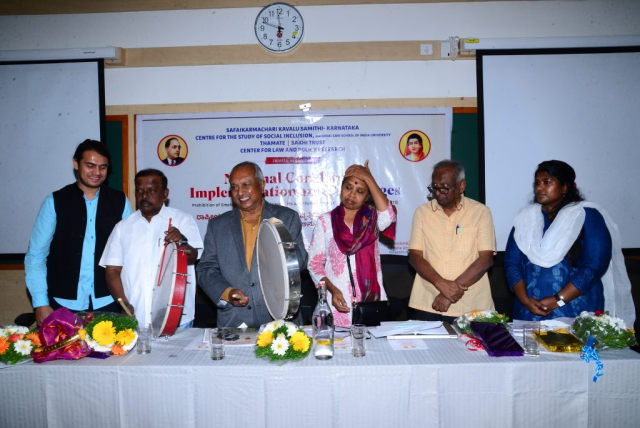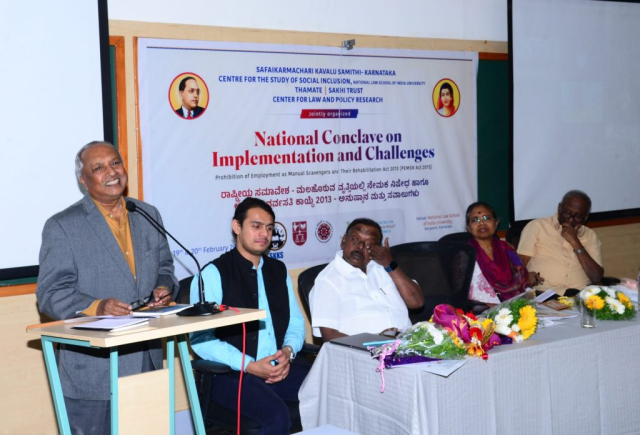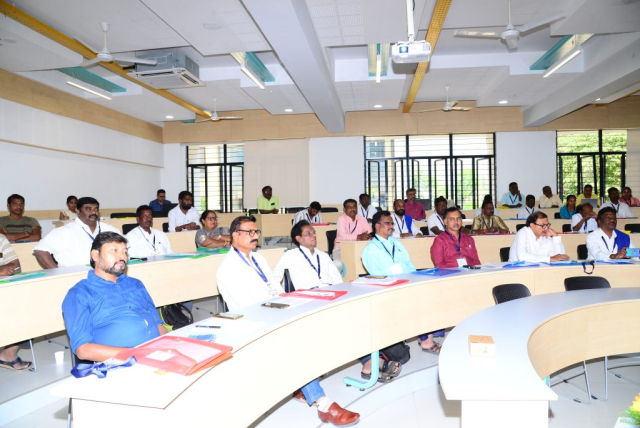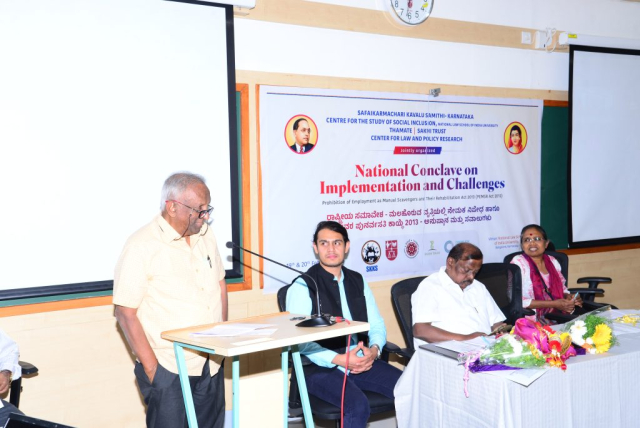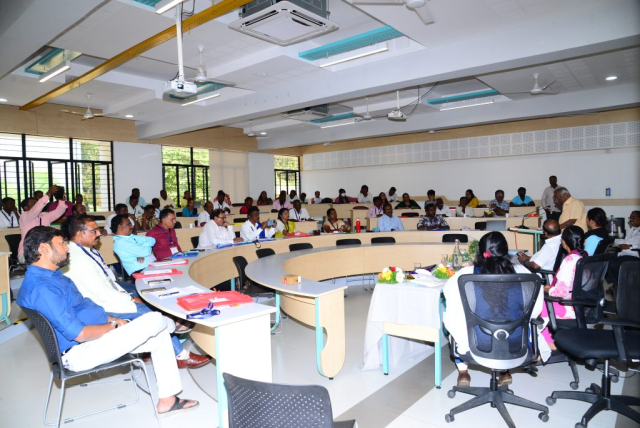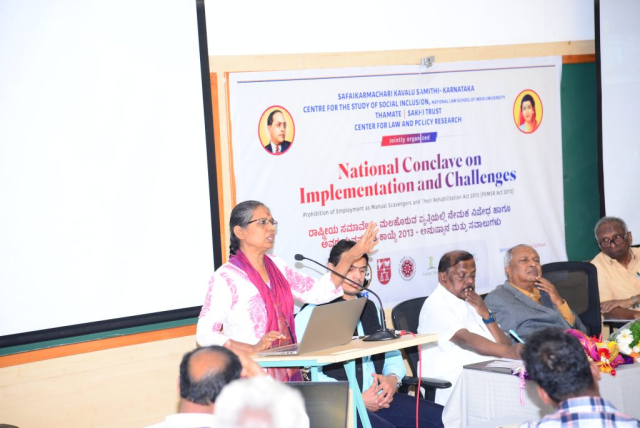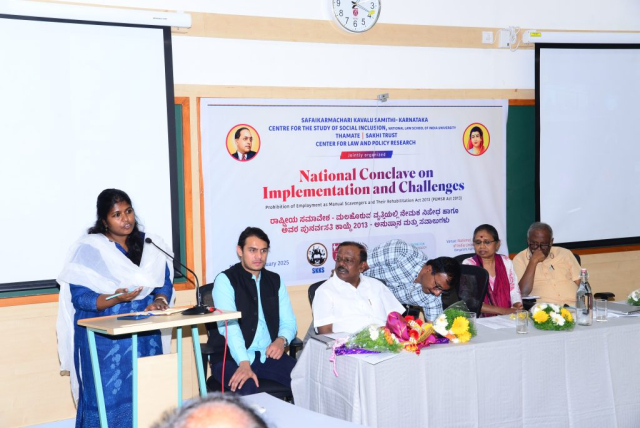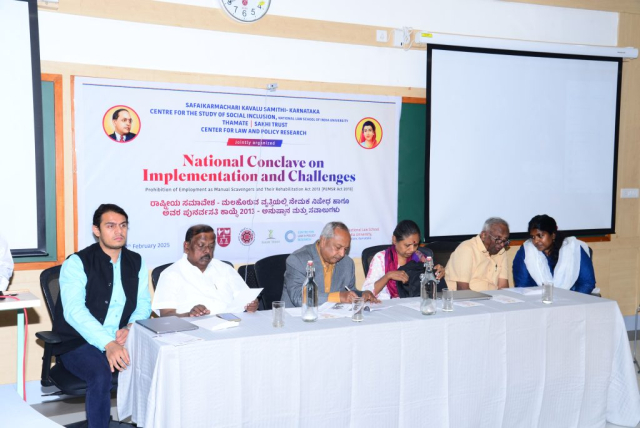National Conclave on ‘Implementation and Challenges of the Prohibition of Employment as Manual Scavengers and their Rehabilitation Act, 2013’
February 28, 2025
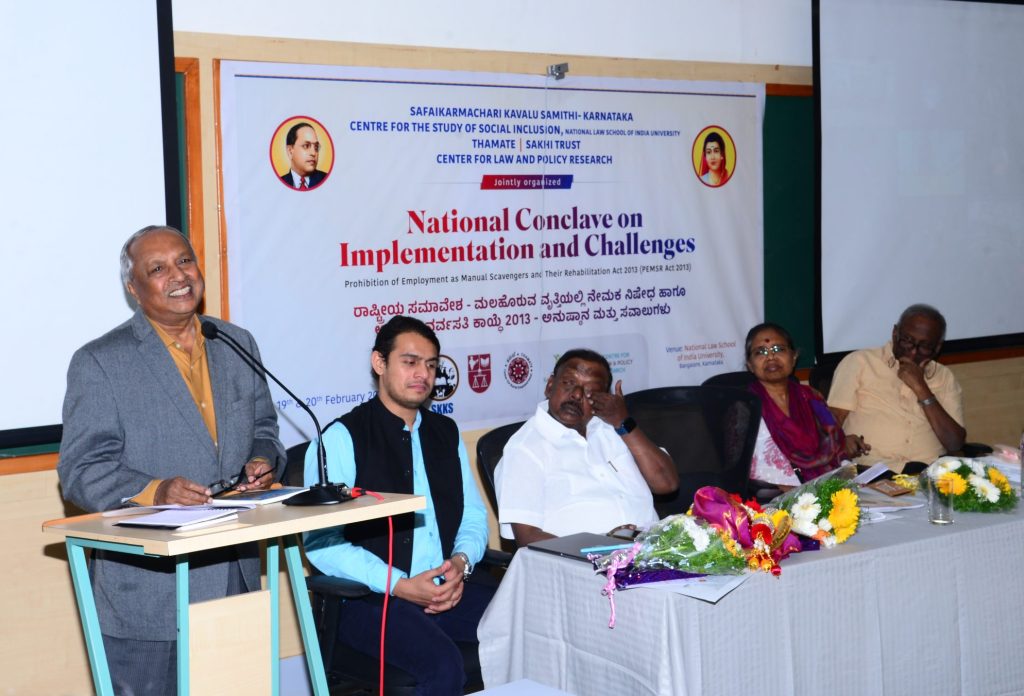 The Safai Karmachari Kavalu Samithi, Karnataka; the Centre for the Study of Social Inclusion, National Law School of India University; and Thamate (ತಮಟೆ) Centre for Rural Empowerment, and the Centre for Law & Policy Research jointly organised a two-day National Conclave on ‘Implementation and Challenges of the Prohibition of Employment as Manual Scavengers and their Rehabilitation Act, 2013,’ on February 19 and 20, 2025 at NLSIU, Bengaluru.
The Safai Karmachari Kavalu Samithi, Karnataka; the Centre for the Study of Social Inclusion, National Law School of India University; and Thamate (ತಮಟೆ) Centre for Rural Empowerment, and the Centre for Law & Policy Research jointly organised a two-day National Conclave on ‘Implementation and Challenges of the Prohibition of Employment as Manual Scavengers and their Rehabilitation Act, 2013,’ on February 19 and 20, 2025 at NLSIU, Bengaluru.
The Conclave which was inaugurated by Justice Nagamohan Das, retired judge of the Karnataka High Court, had a keynote address by former Rajya Sabha member Dr. L. Hanumanthaiah. Other speakers at the inaugural session were Dr. Ashwini K. P., UN Special Rapporteur, Contemporary Forums of Caste and Racism; Senior Advocate Jayna Kothari, Executive Director, Centre for Law & Policy Research; Dr. Du Saraswathi, writer, theatre person and Dalit activist; Prof. Babu Mathew, Faculty & Co-Director, Centre for Labour Studies, NLSIU and Prof. Asang Wankhede, D.Phil (Law) candidate, University of Oxford. Organisations and activists working for the rehabilitation of manual scavengers and safai karamcharis from across India participated in the Conclave, along with various other state-level organisations.
The two-day Conclave deliberated upon the recent Balram Singh v. Union of India judgment, the ongoing national survey to identify manual scavengers, the implementation of the NAMASTE scheme and Prohibition of Employment as Manual Scavengers and their Rehabilitation (PEMSR) Act, 2013. The state-level organisations and South Asian Sanitation Workers and Labour Network (SASLN) in their presentations highlighted the ground realities on the existence of manual scavenging, and sewer and septic tank cleaning.
Outcome
The two-day Conclave culminated with the formation of a national-level coalition which would work to eliminate all forms of manual scavenging.
Context and Rationale
The PEMSR Act was a landmark legislation aimed at eradicating the inhuman and degrading practice of manual scavenging in India. However, more than a decade since its enactment, significant challenges persist in its full implementation. Reports indicate that manual scavenging continues in various parts of the country, often disguised under different forms of employment due to gaps in policy enforcement, lack of rehabilitation mechanisms, and deep-rooted social stigmas.
Given these persistent challenges, the formation of a national-level coalition is imperative. This coalition will act as a unified platform to streamline policy implementation, ensure accountability, facilitate knowledge-sharing, and enhance coordination between central and state governments, civil society organisations, and stakeholders working on the ground.
Objectives of the National-Level Coalition
- Strengthen Policy Implementation: Identify gaps in enforcement, recommend reforms, and push for comprehensive compliance across states.
- Enhance Accountability Mechanisms: Establish mechanisms for regular monitoring and transparent reporting on the implementation status of the Act.
- Foster State and Central Coordination: Ensure uniformity in interpretation and execution of the law while addressing region-specific challenges.
- Empower Affected Communities: Advocate for holistic rehabilitation, skill development, and livelihood programmes to support manual scavengers and their families.
- Mobilise Resources: Facilitate financial support, technological interventions, and infrastructure development to eliminate manual scavenging.
- Advocate for Stronger Legal Action: Push for strict legal action against violators and timely redressal mechanisms for affected individuals.
- Engage Civil Society and Experts: Leverage the expertise of NGOs, activists, legal professionals, and academics to drive systemic change.
Strategic Plan for the Way Forward
1. Institutionalisation of the Coalition
- Formation of a national steering committee with representatives from the Ministry of Social Justice and Empowerment, state governments, civil society organisations, and legal experts.
- Establishment of state-level task forces to coordinate with the national coalition and facilitate local implementation.
- Regular national and regional review meetings to assess progress and challenges.
2. Strengthening Legislative and Policy Frameworks
- Urgent review of existing policies to identify implementation gaps and propose necessary amendments.
- Development of a national action plan with a clear roadmap, timelines, and accountability structures.
- Ensuring stringent penalties and legal action against violations of the MS Act 2013.
3. Enhancing Rehabilitation and Livelihood Opportunities
- Creation of skill development programmes in collaboration with industry partners to provide alternative employment.
- Expanding financial assistance and support schemes, ensuring direct benefit transfers for affected individuals.
- Ensuring proper housing, healthcare, and education support for former manual scavengers and their families.
4. Deploying Technology to Eliminate Manual Scavenging
- Promotion and scaling of mechanised cleaning solutions across urban and rural areas.
- Government subsidies and incentives for local bodies to procure and utilise mechanised cleaning equipment.
- Establishing monitoring dashboards for real-time tracking of implementation and grievance redressal.
5. Advocacy and Social Awareness
- National and state-level campaigns to challenge the stigma around manual scavenging and its affected communities.
- Media partnerships to highlight success stories and expose violations of the law.
- Engagement of religious, cultural, and community leaders to shift societal perceptions and ensure dignity for rehabilitated individuals.
6. Ensuring Data Transparency and Accountability
- Development of a national database to track affected individuals, their rehabilitation status, and ongoing legal actions.
- Annual status reports to be presented before the Parliament and state Assemblies.
- Strengthening of independent monitoring bodies with active civil society representation.
Conclusion
The formation of a national-level coalition is not just a strategic necessity but a moral imperative to uphold the dignity and rights of those affected by manual scavenging. By ensuring a multi-stakeholder, rights-based approach, this coalition will serve as a powerful force in eliminating manual scavenging and ensuring the full realisation of the objectives outlined in the PEMSR Act 2013. The Conclave must now focus on operationalising this coalition with clear responsibilities, timelines, and measurable outcomes for each state and stakeholder.


